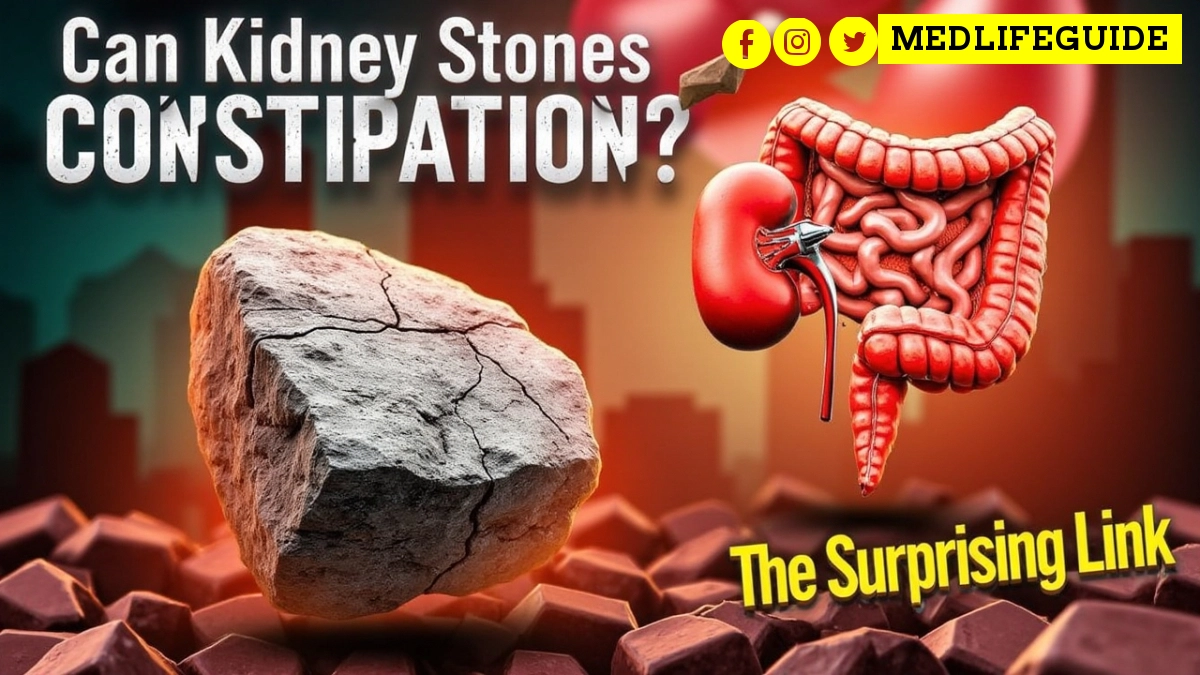Can Kidney Stones Cause Constipation?
Can Kidney Stones Cause Constipation? While kidney stones and constipation may seem unrelated, they can be closely connected through shared factors like anatomy, lifestyle habits, and certain medications. This article delves into how kidney stones might contribute to constipation and provides practical tips for prevention and effective management.
Understanding Kidney Stones and Constipation
What Are Kidney Stones?
Kidney stones are hard deposits of minerals and salts (like calcium, oxalate, or uric acid) that form in the kidneys. They affect 10% of people globally and cause symptoms such as:
- Severe flank or abdominal pain.
- Blood in urine.
- Nausea and vomiting.
What Is Constipation?
Constipation involves infrequent bowel movements (fewer than three per week), hard stools, or straining during defecation. Common causes include:
- Low fiber intake.
- Dehydration.
- Sedentary lifestyle.
Mechanisms Linking Kidney Stones and Constipation
1. Pain-Induced Dehydration
Severe kidney stone pain often reduces appetite and fluid intake, leading to dehydration—a key contributor to constipation. Concentrated urine from dehydration also accelerates stone formation.
2. Medications
Opioids (e.g., codeine) prescribed for kidney stone pain slow gut motility, worsening constipation. Antispasmodics and antacids may have similar effects.
3. Reduced Physical Activity
Pain limits movement, slowing bowel function. Exercise stimulates intestinal contractions, so inactivity exacerbates constipation.
4. Anatomical Overlap
The kidneys and intestines share nerve pathways. Inflammation from kidney stones can irritate nearby bowel tissue, disrupting digestion.
5. Stress and Anxiety
Chronic pain triggers stress hormones like cortisol, which impair gut motility and worsen constipation.
Symptoms: When to Suspect a Connection
| Kidney Stones | Constipation |
|---|---|
| Sharp back/side pain | Fewer than 3 bowel movements/week |
| Blood in urine | Hard, lumpy stools |
| Frequent urination | Abdominal bloating |
| Nausea/vomiting | Straining during defecation |
Red Flags:
- Persistent constipation with kidney stone symptoms.
- Blood in stool or urine.
- Fever or chills (signs of infection).
Diagnosis: Identifying the Root Cause
Tests for Kidney Stones
- CT Scan: Gold standard for detecting stone size and location.
- Ultrasound: Non-invasive imaging for pregnant women or children.
- Urinalysis: Checks for blood, crystals, or infections.
Evaluating Constipation
- Physical Exam: Palpation for abdominal tenderness.
- Colonoscopy: Rules out bowel obstruction.
- Blood Tests: Assess electrolyte imbalances.
Treatment: Dual Management Strategies
A. Treating Kidney Stones
- Hydration: Drink 3–4 liters of water daily to flush small stones.
- Medications:
- Alpha-blockers (e.g., tamsulosin) relax ureters to ease stone passage.
- Pain relievers (avoid opioids if possible).
- Procedures:
- Lithotripsy: Shock waves break stones into passable fragments.
- Ureteroscopy: Laser removal of stones.
B. Relieving Constipation
- Dietary Changes:
- Fiber-rich foods (apples, oats, broccoli).
- Natural laxatives (prunes, chia seeds).
- Lifestyle Adjustments:
- 30 minutes of daily walking.
- Establish a regular bathroom routine.
- Medications:
- Osmotic laxatives (polyethylene glycol).
- Stool softeners (docusate sodium).
Prevention: Breaking the Cycle
Prevent Kidney Stones
- Hydrate: Aim for pale yellow urine.
- Limit Sodium: High salt intake increases calcium in urine.
- Citrate-Rich Foods: Lemons, oranges, and melons inhibit stone formation.
Avoid Constipation
- Fiber Intake: 25–30 grams daily from whole grains and vegetables.
- Probiotics: Yogurt and kefir improve gut health.
- Mindful Eating: Chew thoroughly and avoid processed foods.
When to See a Urologist
Consult a specialist if you experience:
- Unrelenting pain despite home care.
- Blood in urine or stools.
- Constipation lasting over 3 weeks.
- Signs of infection (fever, cloudy urine).
FAQs
1. Can kidney stones physically block the bowels?
While rare, large stones may erode into the intestines, causing obstruction. Immediate surgery is required.
2. Does dehydration worsen both conditions?
Yes. Dehydration concentrates urine (promoting stones) and hardens stools (causing constipation).
3. Which foods prevent both kidney stones and constipation?
- Citrus fruits (lemons, oranges).
- High-fiber veggies (spinach, carrots).
- Whole grains (oats, quinoa).
4. Are laxatives safe with kidney stones?
Osmotic laxatives are safer than stimulants, which may cause dependency. Always consult a doctor.
Conclusion
Kidney stones and constipation often coexist due to shared triggers like dehydration, pain, and medications. Addressing both conditions requires a holistic approach: stay hydrated, prioritize fiber, and seek timely medical care. By understanding this link, you can take proactive steps toward better urinary and digestive health.

